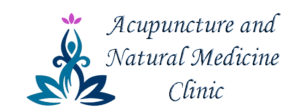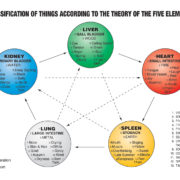Your Health in Summer: The Five Element Theory & the Season of Abundance and Joy
We are all looking forward to summer! The season officially begins on the longest day of the year, the Summer Solstice on June 21. The extra hours of sunlight nurture and energize nature thereby creating an abundance of life all around us. The summer season is next in our series exploring the Five Element Theory of acupuncture, which is a guide to how each element corresponds to an internal organ system, and each system is associated with certain physical and psychological conditions. We’ve discussed the following season-element pairs so far: Fall-Metal, Winter-Water, and Spring-Wood. With summer comes fire.
Summer: The Fire Element
Summer’s radiating brightness illuminates both our inner being and external world, so joy seems to surround us. Therefore it is no coincidence that Traditional Chinese Medicine (TCM) relates summer to the Fire element. This season is the time of warmth, activity, growth, movement and building relationships. It’s the yang of expanding energy. So when TCM speaks of imbalances in the Fire element, we are seeing symptoms associated with disturbance to or diminishing levels of physical and mental/emotional energy. Physical indicators include:
• Cardiac pain, palpitations or irregular heartbeat
• Lack of or excessive perspiration
• High or low blood pressure
• Circulatory problems, fainting
• Rashes, hives, red skin eruptions
• Loss of voice, speech problems
• Abdominal pain
• Hormonal imbalances, hot flushes
• Metabolism and thyroid issues
• Immune deficiency and other endocrine disorders.
Mental/emotional energy disruptions include:
• Sleep disturbances: insomnia or restlessness
• Anxiety and agitation
• Memory loss
• Fatigue, depression, and feeling disconnected.
The Four Meridians of Fire
In the Five Element Theory, there are four meridians related to summer’s Fire element: Heart, Pericardium, Small Intestine, and Triple Heater. Each meridian is related to certain organs or systems; and each organ or system experiences the related symptoms listed above when an imbalance is present.
The Heart meridian originates in the heart and spreads through the heart and circulatory system, also known as the cardiovascular system. It is responsible for mental wellness, sleep, consciousness, memory, and vitality. When balanced, it contributes to wisdom, peacefulness, and healthy relationships. A Heart meridian imbalance is indicated by disturbed or inappropriate behavior, anxiety, insomnia, as well as the presentation of cardiovascular symptoms—ischemia, tachycardia (racing heartbeat) or palpitations, as well as high or low blood pressure. Broken heart syndrome, for example, can be brought on by extreme emotions or stress, or by a serious physical illness, either of which affects the body by rapidly releasing stress hormones like cortisol. It often leads to chest pain and tightness, breathlessness, arrhythmia (irregular heartbeat), and/or tachycardia. According to TCM, the heart is a “holder of the spirit”, so it is important also to address emotional wellness when treating physical heart symptoms.
The Small Intestine meridian is known as the “sorter of pure from impure”. In the body, the small intestine is responsible for extracting nutrients from digested food and passing on the waste. This function of the small intestine within all detoxification protocols often gets overlooked. It is important to understand that processed foods, preservatives, sugar, water pollutants, and antibiotics and other pharmaceuticals can overwhelm the small intestine. These toxic agents diminish the ability of the stomach and small intestine to kill pathogenic bacteria and break down protein, which slows down digestion. As a result, the small intestine becomes inflamed and builds up mucus. This creates a condition called SIBO (small intestine bacterial overgrowth), which inhibits nutrient absorption and can present as abdominal pain. Anti-inflammatory herbs as well as digestive enzymes are used in TCM to stabilize small intestine function. On a mental level, small intestine imbalance is represented by confusion and the inability to prioritize aspects of one’s life. Clear thinking and concentration is a challenge for people whose Small Intestine meridian is disrupted.
According to TCM, the Small Intestine meridian is paired with the Heart meridian. These pathways have facial coordinates in their network so that when imbalances are in the body, there are indicators in your face. For the Heart meridian, these are located at the tip of the nose, and at the side of the upper and lower lips. For the Small Intestine, the coordinates are at the jaw line and just above the lateral lip line. Imbalances can appear as bluish lips with a white border, sweating, and tongue and/or throat discomfort.
The Pericardium, in Western medicine, is a double-layered sac that surrounds and protects the heart. In Chinese medicine, it is also “the gate to the heart”. It allows in positive energy and protects us from negative energies and pathogens penetrating the heart’s inner sanctum. On the mental and emotional level the Pericardium meridian is responsible for connection and relationships with others. But it is also responsible for blood circulation. An unbalanced Pericardium meridian physically causes chest congestion, nausea and vomiting, cardiac pain, palpitations and irritability, shortness of breath, and even pericarditis. When blockages or swelling disrupt that flow, fatigue, fainting, and poor circulation can occur. A balanced Pericardium is also important for normal mental activity as enough blood flow moistens and nourishes the whole body and brain.
The Triple Heater meridian is responsible for the immune system, hormones, and energy distribution (i.e., all things related to thermal regulation). In TCM, the Triple Heater meridian is the only “organ” that is solely functional and has no anatomical counterpart—an organ without an assigned organ. When the Triple Heater meridian is physically imbalanced, it can appear as tinnitus, deafness, or earache; or as hot flashes and hormonal imbalances; or as insufficient immunity, fever, or constipation. On an emotional level, it is responsible for vitality, regulates consciousness, mental stability, kindheartedness and the emotion of joy. Therefore, disturbances can involve depression, anxiety and fatigue.
As part of its energy distribution function, the Triple Heater generates energy to support numerous endocrine glands in the body that together produce over 30 distinct hormones. The major organs and glands producing hormones and their functions include:
• Thyroid – regulates your energy and metabolism
• Adrenals – secrete cortisol and respond to emergencies
• Pituitary gland – the master gland that controls other glands; also influences growth, metabolism and regeneration
• Hypothalamus – regulates hunger, thirst, sleep, body temperature
• Thymus – helps build the immune system
• Parathyroid gland – secretes hormones to absorb calcium
• Pancreas – aids in digestion and produces insulin to control blood sugar level
• Ovaries or testicles – determines your mental vigor and libido
• Pineal gland (third eye) – regulates wake/sleep pattern and seasonal functions
Summertime Tips for Good Health
Summer is an important time to replenish and nourish these four seasonal meridians discussed here. And depending on what aspect of Fire, which meridians/organs are involved with your expressed symptoms or current feelings, there are plenty of individual prescriptions to improve health and wellness. Generally, what can we do to heal ourselves in summer?
Summer is time to play and relax, de-stress. Do breathing exercises, meditate, and calm your mind. Trust your intuition and follow your heart.
Exercise for a healthy heart and circulatory system. The season invites warm weather and sunshine, and outdoor and water sports abound. Movement helps to cleanse toxins by sweating, and builds up Vitamin D.
Enjoy the nutritional bounty of the season! Eat cooling foods, especially vegetables and fruit in season. Bitter greens are a taste of summer and nourish Fire element organs. Avoid sugar, preservatives, water contaminants, and processed food.
Detoxify the small intestine according to your condition. Use a food combining approach to relieve discomfort when indigestion or other abdominal distress occurs.
Vitality, circulation and anti-inflammatory herbs as well as antioxidants will help the Heart and Small Intestine functions. Digestive and anti inflammatory enzymes can also be beneficial. Consider adding these supplements to your diet. Extra testing by your practitioner may be required if more, or specific symptoms appear.
Go through a personal checklist of hormone function with your practitioner to prevent any future imbalances.
And no matter what the season, practice sleep hygiene!
Summer floods us with light and energy. You can experience an abundance of both in your life when you maintain good health and practice good habits. Be well!Helena Amos, M.Ac., L.Ac., is a licensed acupuncturist, European physician, and natural medicine practitioner since 1986. She is the owner of the Acupuncture and Natural Medicine Clinic in Rockville, MD, and is available for in-office and telehealth complementary consultations. Call 301-881-2898, email doctorhelena@gmail.com, and visit rockvilleacupuncturemd.com/ for more information about clinic services. LIKE on Facebook @AmosAcupunctureAndNaturalMedicine. See also her ad on page


